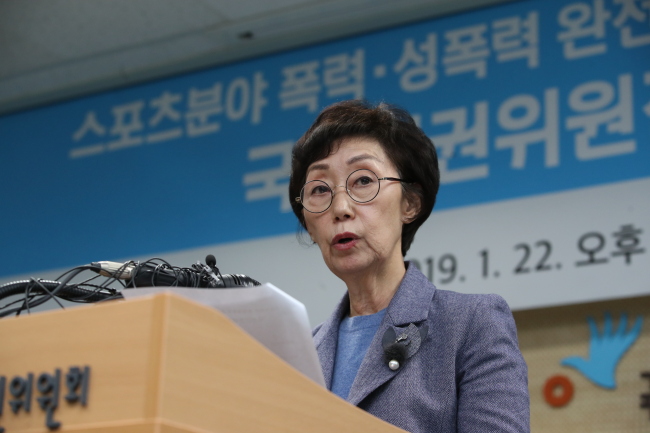Following rampant allegations of sexual misconduct by authority figures in the skating community, the chief of the National Human Rights Commission of Korea on Tuesday vowed to establish an independent monitoring system to root out widespread violence in sports.
“Physical and sexual harassment in the sports community take place repeatedly within a structured system, rather than accidentally. Violence is exonerated in the performance-centered culture,” said Choi Young-ae, the head of the rights watchdog, at a press conference in central Seoul.
“The National Human Rights Commission of Korea has decided to set up a special investigation team on sports (athletes’) human rights.”
The special investigation team, which has a one-year mandate, is to consist of officials from the Education Ministry, the Sports Ministry and the Ministry of Gender Equality and Family.
With the aim of creating an independent, standing state-run system that victims can trust, the special investigation team will work on fact-finding and on providing legal guidance for victims who step forward, among other tasks, the commission said.
 |
Choi Young-ae, head of the National Human Rights Commission of Korea, speaks at a press conference in central Seoul on Tuesday. (Yonhap) |
Since two-time Olympic short-track gold medalist Shim Suk-hee, 22, accused her former coach Cho Jae-beom, 38, of rape last month, several athletes have come forward with similar revelations. Cho has been accused of sexually molesting Shim multiple times since 2014, when Shim was 17 years old.
To explain the rampant nature of the misconduct, including sexual misconduct, in Korea’s sports community, experts point to the existence of strict hierarchies and unbalanced power relationships that make it difficult, if not impossible, for young athletes to stand up to authority figures.
In 2010 the rights watchdog established guidelines to protect human rights in the sports community, especially for student athletes. The guidelines were based on policy recommendations it had issued in 2007 and 2008.
Amid growing pressure from the public for Lee Ki-hong, the chairman of the Korean Sport and Olympic Committee, to take responsibility for the widespread physical and sexual violence in the skating and sports communities, members of the minor liberal Party for Democracy and Peace called for Lee’s resignation.
“Punish everyone in the Korean Sport and Olympic Committee cartel that forced silence on victims, aiding and abetting misconduct!” the party’s committee on women’s rights chanted outside the Korean Sport and Olympic Committee building in Seoul. “And for being accomplices to sexual abuse in the skating community!”
Meanwhile, a local newspaper reported that former varsity archer Kim Mi-seung, 21, quit the sport she had practiced for 10 years after a senior female archer repeatedly sexually molested Kim over a four-month period in 2017, when she was a freshman.
“It was miserable and painful. She started touching me during training sessions at the archery center, and continued to touch my breasts and buttocks even when the manager was present,” Kim was quoted as saying.
Kim went to her manager for help, but was told, “Win with performance. You are second (on the team) and she is first. If you become No. 1, you will become the center of the archery center.”
Kim’s senior remains on the varsity team.
By Kim Bo-gyung (
lisakim425@heraldcorp.com)








